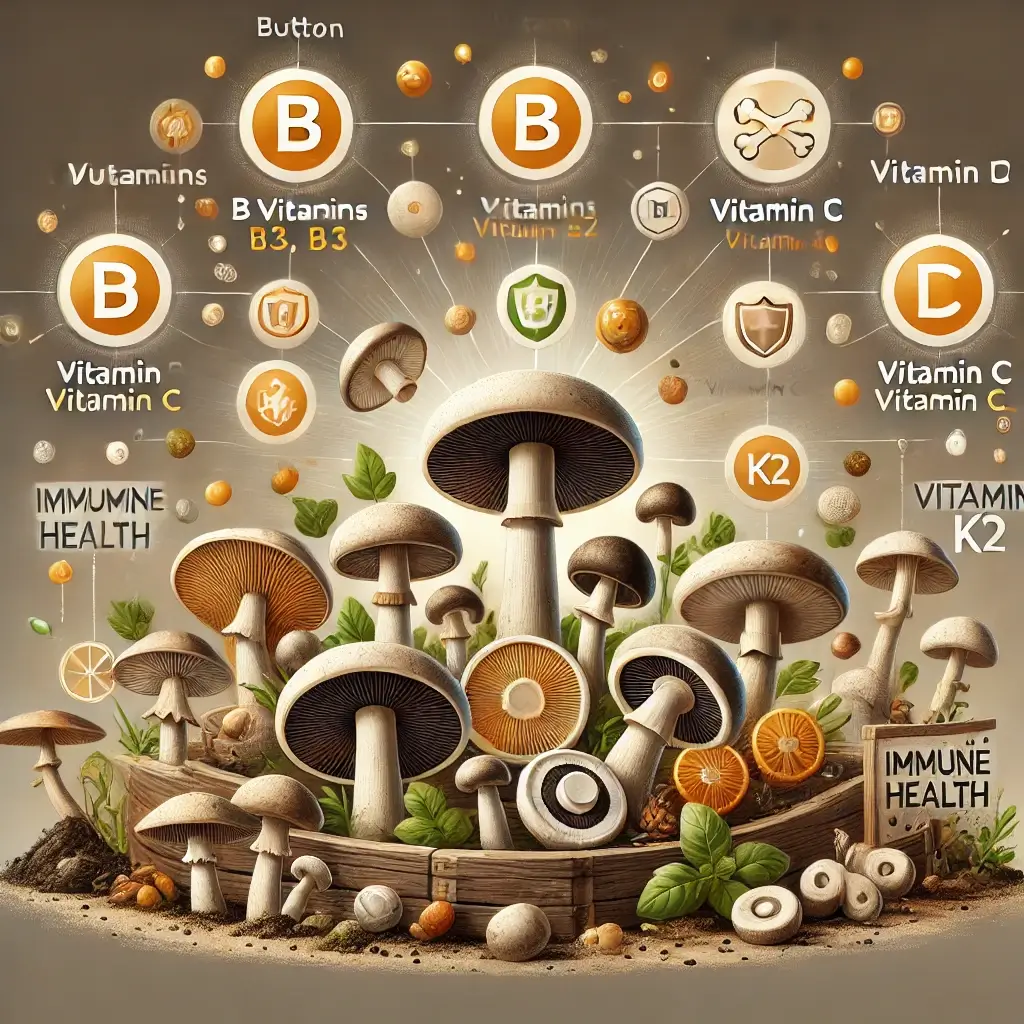The Essential B Vitamin Complex in Mushrooms
Mushrooms are high in various vitamins, including:
B vitamins: Mushrooms include riboflavin (vitamin B2), niacin (vitamin B3), pantothenic acid (vitamin B5), folate (vitamin B9), and vitamin B12. These nutrients are required for energy production and metabolism.
The Sunshine Vitamin Connection
Some mushrooms, such as portobello mushrooms, have been treated to UV light and contain vitamin D. Vitamin D is essential for bone health as well as immunological function.
Antioxidant Protection from Mushrooms
Vitamin C: Button mushrooms are high in vitamin C. Vitamin C is an antioxidant that aids in cell protection.
Blood Clotting Benefits
Mushrooms are an excellent source of vitamin K. Vitamin K is required for blood coagulation.
Trace Vitamins in Fungi
Other vitamins: Mushrooms contain trace levels of other vitamins such as vitamin A, E, and K2.
Understanding Vitamin K2 in Mushrooms
Mushrooms do contain vitamin K2. Vitamin K2 is a vitamin group that is necessary for blood clotting and bone health. Vitamin K2 is classified into two types:
The MK-4 Connection
MK-4 is the body’s most abundant form of vitamin K2. It is created by gut bacteria and can also be found in some foods, such as natto, a fermented soybean dish.
Bacterial Origins of MK-7
MK-7: This is a kind of vitamin K2 generated by bacteria and found in fermented foods such as cheese and sauerkraut.
Mushroom Varieties Rich in Vitamin K2
MK-4 and MK-7 are both found in mushrooms. The amount of vitamin K2 in mushrooms varies according to the kind. Vitamin K2 is abundant in button mushrooms, cremini mushrooms, and portobello mushrooms.
Daily Vitamin K2 Requirements
Adults should consume 100 micrograms of vitamin K2 each day. One cup of sautéed mushrooms contains approximately 20 micrograms of vitamin K2.
Multi-System Benefits of Vitamin K2
Vitamin K2 aids in blood coagulation and bone health. It is also beneficial to heart and brain health.
Health Benefits of Vitamin K2
Here are some of vitamin K2’s health benefits:
The Role in Blood Clotting
Blood clotting: Vitamin K2 is required for proper blood clotting. It aids in the activation of proteins that aid in the prevention of bleeding.
Bone Health and Calcium Management
Bone health: Vitamin K2 is beneficial to bone health. It promotes calcium absorption into the bones while also preventing calcium from depositing in the arteries.
Cardiovascular Protection
Cardiovascular health: Vitamin K2 may help lessen the risk of heart disease. It has been demonstrated to cut cholesterol and the risk of heart attack and stroke.
Cognitive Benefits of Vitamin K2
Brain health: Vitamin K2 may aid in the prevention of Alzheimer’s disease and dementia. It has been demonstrated that it improves cognitive performance in elderly persons.
Mushrooms as a Healthy Source of Vitamin K2
Mushrooms are a wonderful alternative if you want to improve your vitamin K2 intake in a healthy way. They are low in calories and fat, and they contain a variety of other nutrients that are necessary for optimum health.
The Mineral Profile of Mushrooms
Mushrooms are high in minerals such as potassium, phosphorus, selenium, and copper, in addition to vitamins.
Understanding the B Vitamin Benefits
Here are some of the health benefits of mushrooms’ vitamins:
B vitamins are necessary for energy production and metabolism. They also aid in the nervous system, skin health, and the creation of blood cells.
How Vitamin D Supports Our Body
Vitamin D: Vitamin D is necessary for good bone health. It also aids in immune system regulation.
The Protective Power of Vitamin C
Vitamin C is an antioxidant that aids in the protection of cells from harm. It is also necessary for wound healing and immune system function.
Vitamin K’s Dual Health Function
Vitamin K: Vitamin K aids in blood coagulation. It also helps with bone health.
Additional Vitamin Benefits from Mushrooms
Other vitamins: The vitamins found in mushrooms are also beneficial to one’s health. Vitamin A helps with vision, vitamin E is an antioxidant, and vitamin K2 helps with bone health.
The Nutritional Profile of Mushrooms
Mushrooms are a nutritious food that can be included in a well-balanced diet. They are low in calories and fat, and they include a variety of nutrients that are necessary for optimal health.
Creative Ways to Include Mushrooms in Your Diet
Here are some suggestions for including more mushrooms in your diet:
Mushrooms can be added to stir-fries, soups, and salads.
As a side dish or appetizer, grill mushrooms.
Fill mushrooms with your preferred fillings.
Make meatballs or mushroom burgers.
Pasta meals can benefit from the addition of mushrooms.
Mushrooms can be blended into smoothies.
You can easily add more mushrooms into your diet and gain the many health advantages of this versatile cuisine with a little imagination.
References
- Cardwell G, Bornman JF, James AP, Black LJ. A Review of Mushrooms as a Potential Source of Dietary Vitamin D. Nutrients. 2018;10(10):1498.
- Feeney MJ, Dwyer J, Hasler-Lewis CM, et al. Mushrooms and Health Summit proceedings. J Nutr. 2014;144(7):1128S-36S.
- Beulens JW, Booth SL, van den Heuvel EG, Stoecklin E, Baka A, Vermeer C. The role of menaquinones (vitamin K₂) in human health. Br J Nutr. 2013;110(8):1357-68.
- Phillips KM, Ruggio DM, Haytowitz DB. Folate composition of 10 types of mushrooms determined by liquid chromatography-mass spectrometry. Food Chem. 2011;129(2):630-636.
- Valverde ME, Hernández-Pérez T, Paredes-López O. Edible mushrooms: improving human health and promoting quality life. Int J Microbiol. 2015;2015:376387.
